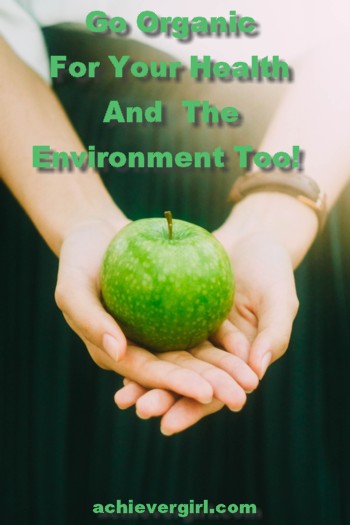You have to be mindful when it comes to a healthy life. Eating organic food not only improves your health but organic farming supports the environment too.
10 reasons to go organic:
- More nutrients for health benefits

- Avoid chemical pesticides
- Better taste
- Avoid gmo (genetically modified organisms)
- Avoid antibiotics, hormones and drugs in animal products
- Reduce pollution, protect our soil and water
- Preserve ecosystems
- Directly supporting farming
- Preserve agricultural diversity
- Keep a sustainable future for generations to come
When I go grocery shopping, I always choose certified organic foods first before anything else. And when I buy non-organic foods, I look for the non-gmo verified label. I don’t support genetically modified (gmo) foods as don’t believe they are required and we don’t know the long term effects on our body (or environment). I don’t think it’s natural or necessary to manipulate genes like that in our food source and just see it as another way to make a huge amount of money, for corporations and government, at the expense of the consumer.
Related:
- Eating Healthy To Stay Healthy The Homemade Way To Do It
- 10 Amazing Health Benefits Of Ginger You Are Missing Out On
- How I Avoided Colds And Flus For Over 13 Years You Can Too
- 10 Powerful Health Benefits Of Ceylon Tea
Maybe a couple of the main reasons for the inception of gmo was due to bugs getting resistant to pesticides, where more and more pesticides are needed, and food sources will run out for the world so yield is supposedly higher with gmo. I don’t think so. That’s just not smart farming to tackle resistant bugs with stronger pesticides or planting geneticially modified seeds (that contain or are sprayed with insecticides) as a solution. This obviously is a huge argument for or against gmo. But there have been animal studies showing the harm of gmos. And besides, if they are supposed to be safe and healthy, why hiding which foods contain them.
If you look in other areas to help the environment, it would be to try to keep it in a natural state as possible and not add things to make it become unnatural, such as pollutants that daily go in the air from airplane and automobile fumes plus other chemical pollutants from industries that are affecting the climate. So if somehow gmo products are supposed the help the environment, I would question how.
Just remember if the food you buy from the store does not indicate it is non-gmo or certified organic, there is a very good chance that it likely contains gmo ingredients (as most processed food does). Here in Canada, they don’t have to indicate if the food is gmo so now to offset that, labels are going up for non-gmo products because consumers want to know, and have the right to know what is in their food. So presume it contains gmo unless stated otherwise.
10 common foods that are likely to contain gmo, unless are labeled certified organic or non-gmo project verified:
- Corn (corn oil, corn starch, cornmeal, corn syrup, polenta, hominy, polenta, and other foods containing corn ingredients)
- Soybeans (soybean oil, soy milk, soy protein, tofu, soy lecithin, and other foods containing soy ingredients
- Yellow Squash and Zucchini
- Canola (canola oil)
- Cottonseed (cottonseed oil)
- Alfalfa (fed to livestock)
- Sugar Beets
- Potatoes
- Apple
- Papaya (Hawaii & China)
If you are concerned about gmo in your food supply, having both the certified organic and non-gmo project verified labels on the foods you buy gives double protection in guaranteeing that there are no gmo’s in it.
I don’t know about you but I rather go organic than consume chemical pesticides and gmo’s. Not only do we have to look at the health perspective but, also, that we are using sustainable methods to protect our soil and our environment for years to come.
26/365



